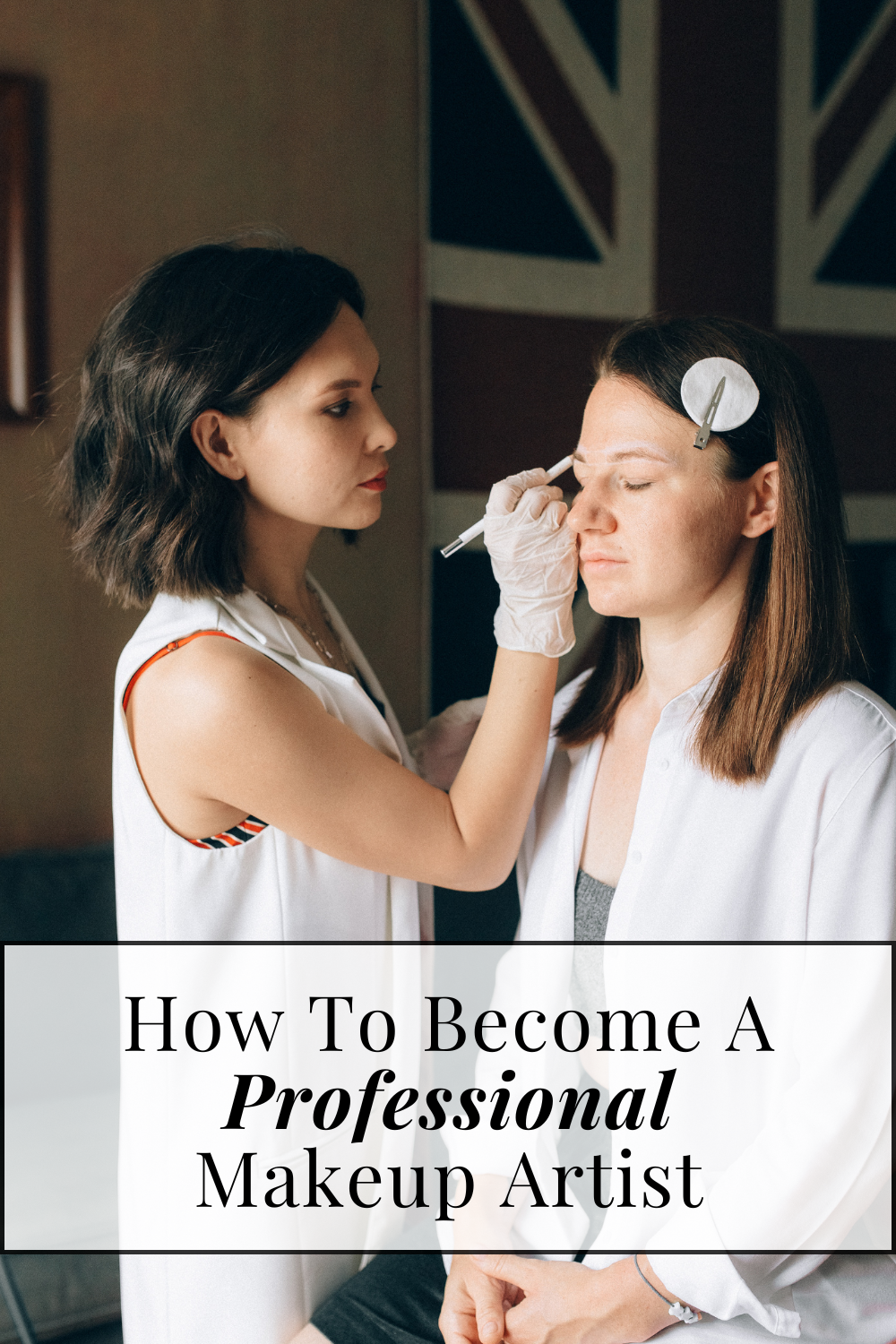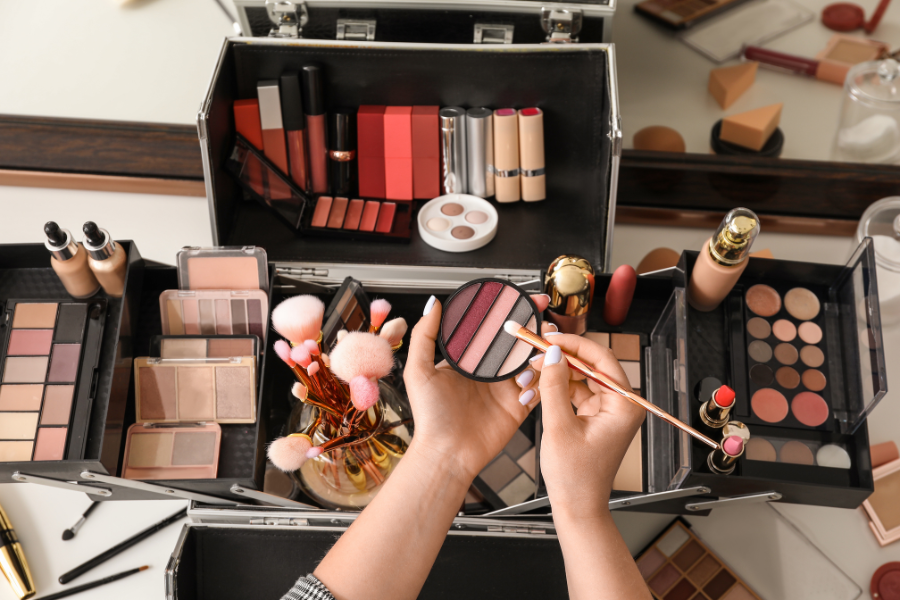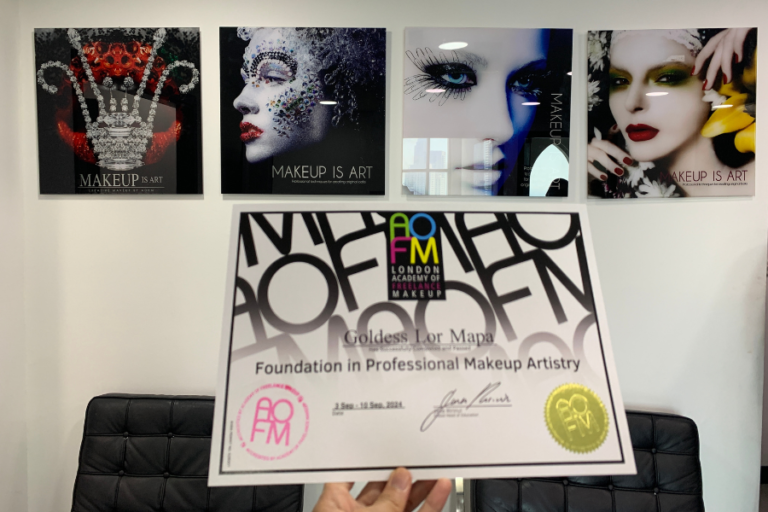Don’t know where to start on how to become a professional makeup artist? Read on to learn how to get started with these actionable tips and tricks!

If you think professional makeup artistry is easy, think again. As a beginner makeup artist myself, I found that there are so much to learn in professional makeup artistry. And yes, even when you’re a natural-born makeup lover!
Becoming a successful professional makeup artist requires more than just a beautiful finished work of art. Aside from creativity, it also involves developing good customer relationships, networking skills, and continuous learning.
You’re going to learn all about how to become a professional makeup artist, from qualifications for makeup artist, makeup artist kit, freelance makeup artistry, and many more.
At the end of this post, you’ll be learning how to become a successful makeup artist, or at the very least, you’ll be extra prepared when choosing to start your career as one.
This post is all about how to become a professional makeup artist.
How to Become a Professional Makeup Artist
1. Build a Solid Foundation of Skills
Whether you’re starting out as a freelancer or changing careers to makeup artistry like me, you have to develop a solid foundation of skills.
And by building these skills, I don’t mean to learn from our YouTube Academy. No pun intended.
You’ll have to invest your money and time in a professional and certified makeup school. Here, they teach you what they’ve been doing for decades! Here are some lessons you’ll learn that most beauty influencers don’t tell you:
- Color Theory. Although it became viral in 2023, this concept has been used by the beauty industry for centuries.
- Hygiene. If you’ve ever experienced going to a makeup artist and started doing your makeup with a sponge that touched someone else’s face and thought that’s fine, the lessons here are for you.
- Face Shapes. Since beauty influencers know every edge and corner of their faces, they don’t tell you how to work with other face shapes besides their own.
Practical Steps:
- Professional Makeup Course. Consider enrolling in a professional makeup artistry course and gain professional training and certification. These courses cover essential topics like hygiene, skin preparation, makeup application on different face shapes and skin tones, and special effects makeup. Read my experience with my professional training here!
- Practice, Practice, Practice. Training is not enough when you don’t put it into practice. Practicing and experimenting with your face is good but if you want to hone your skills as a professional makeup artist, you’ve got to practice on others. Grab a friend or a sister and make them your canvas!
- Try To Keep Up. Keep up with the latest trends and techniques. The beauty industry evolves rapidly, and staying current ensures your skills remain relevant. You can also get inspiration by following you favorite professional makeup artists on Instagram or YouTube. My personal favorite is Julie Ruby. She’s just so real and she’s giving business tips too!
2. Build a Professional Makeup Artist Kit
I’ve heard so many professional makeup artists say that your kit is an extension of you as an artist.
A well-stocked and organized makeup kit is crucial for any makeup artist. Invest in high-quality makeup products and tools that cater to different skin tones and types.
Your kit should include a variety of foundations, concealers, eyeshadows, lipsticks, brushes, and other essential tools. Make sure to keep your kit clean and sanitized to ensure the safety of your clients.
Practical Steps:
- Quality over Quantity: Invest in high-quality products even if it means starting with fewer items. Quality products yield better results and client satisfaction.
- Diversify: Include products for different skin tones and types. Being prepared for various skin types ensures you can accommodate any client.
- Regular Maintenance: Clean and sanitize your tools regularly to maintain hygiene standards. Regular maintenance prevents skin issues and infections.

Useful read …
Your PRO MUA Kit: The essentials you’ll love
3. Create a Professional Makeup Artist Portfolio
Your portfolio is a visual representation of your work and skills. It showcases your ability to create different makeup looks and styles. Start by taking high-quality photos of your makeup looks on friends, family, or models.
As you gain more experience, update your portfolio with professional photos from photoshoots, weddings, or other events you work on.
Practical Steps:
- Photography Skills: Learn basic photography skills or collaborate with photographers to get high-quality images. Clear, well-lit photos highlight your work effectively.
- Diverse Looks: Show a variety of makeup styles in your portfolio, from natural looks to bold, creative ones. A diverse portfolio demonstrates your versatility.
- Online Presence: Create an online portfolio or a website where potential clients can view your work. An online presence makes it easier for clients to discover and contact you.
4. Network and Collaborate
Networking is a vital aspect of building a successful career as a makeup artist. Connect with other professionals in the beauty and fashion industry, such as photographers, models, hairstylists, and fashion designers.
Attend industry events, workshops, and makeup trade shows to meet new people and learn about the latest trends and products. Collaborate on projects to gain more exposure and experience.
Practical Steps:
- Join Communities: Become a member of professional makeup artist associations or online communities. These platforms offer valuable networking opportunities and resources.
- Attend Events: Participate in beauty and fashion industry events to expand your network. Events are great places to meet potential clients and collaborators.
- Collaborate: Work with other artists and professionals on photoshoots, fashion shows, and creative projects. Collaboration expands your experience and portfolio.
5. Market Yourself
To attract clients and build your brand, you need to market yourself effectively. Utilize social media platforms like Instagram, Facebook, and TikTok to showcase your work and connect with potential clients.
Create engaging content, such as makeup tutorials, behind-the-scenes videos, and beauty tips. Use hashtags and collaborate with influencers to increase your visibility.
Practical Steps:
- Social Media Presence: Post regularly on social media and engage with your audience. Consistent posting keeps you visible and builds a following.
- Content Creation: Share tutorials, tips, and behind-the-scenes content to showcase your expertise. Educational content positions you as a knowledgeable professional.
- SEO Optimization: Optimize your online content with relevant keywords to improve your search engine ranking. Better SEO makes it easier for clients to find you.
6. Offer Excellent Customer Service
Providing excellent customer service is key to building a loyal client base. Be professional, punctual, and attentive to your clients’ needs and preferences. Listen to their requests, provide personalized recommendations, and ensure they feel comfortable and satisfied with your services.
Positive client experiences often lead to word-of-mouth referrals and repeat business.
Practical Steps:
- Communication Skills: Develop strong communication and listening skills to understand client needs. Clear communication helps meet client expectations.
- Professionalism: Be punctual, respectful, and professional in all your interactions. Professionalism builds trust and a positive reputation.
- Feedback: Ask for feedback and continuously improve based on client suggestions. Feedback helps you refine your services and enhance client satisfaction.
7. Continuously Educate Yourself
The beauty industry is constantly evolving, with new trends, products, and techniques emerging regularly. Stay updated by attending workshops, masterclasses, and beauty conventions.
Follow industry leaders and influencers to learn about the latest innovations and trends. Continuous education helps you stay competitive and offers your clients the latest looks and products.
Practical Steps:
- Workshops and Classes: Attend makeup workshops and advanced classes to learn new techniques. Advanced education keeps your skills sharp and current.
- Follow Trends: Keep an eye on beauty magazines, blogs, and social media for the latest trends. Being aware of trends ensures you can offer clients the latest looks.
- Certifications: Obtain additional certifications in specialized areas like bridal makeup or special effects. Certifications validate your expertise and enhance your credentials.
8. Understand Business Basics
As a freelance makeup artist, you’ll need to manage your own business. This involves understanding the basics of marketing, accounting, pricing, and client management.
Learn how to set your rates, manage bookings, and handle invoices. Consider taking a small business course or seeking advice from experienced professionals to help you navigate the business side of your career.
Practical Steps:
- Business Courses: Take courses in business management, marketing, and accounting. Business knowledge is essential for running a successful freelance career.
- Pricing Strategy: Develop a pricing strategy that reflects your skills and market demand. Competitive pricing attracts clients while ensuring profitability.
- Client Management: Use tools and software to manage appointments, invoices, and client communications. Efficient client management enhances professionalism and client satisfaction.
9. Stay Passionate and Resilient
Building a successful career as a makeup artist takes time, dedication, and resilience. Stay passionate about your craft and be patient with your progress. You’ll face challenges and setbacks, but staying motivated and committed to your goals will help you overcome obstacles. Surround yourself with supportive people who encourage your growth and celebrate your successes.
Practical Steps:
- Set Goals: Set short-term and long-term goals for your career and track your progress. Goals provide direction and motivation.
- Stay Inspired: Follow inspiring makeup artists and keep experimenting with new looks. Inspiration fuels creativity and passion.
- Support Network: Build a support network of friends, family, and fellow artists who can offer advice and encouragement. Support systems provide strength during challenging times.
10. Seek Out Mentorship
Finding a mentor can be incredibly beneficial as you navigate your career as a makeup artist. A mentor can provide valuable insights, advice, and guidance based on their own experiences in the industry. They can help you refine your skills, avoid common pitfalls, and offer support as you grow professionally.
Practical Steps:
- Identify Potential Mentors: Look for experienced makeup artists or industry professionals who you admire and respect. Identifying the right mentor is crucial for effective guidance.
- Build Relationships: Attend industry events, join professional organizations, and network to meet potential mentors. Building relationships creates opportunities for mentorship.
- Ask for Guidance: Approach potential mentors with specific questions or requests for advice, demonstrating your commitment and willingness to learn. Specific inquiries show you value their expertise.
11. Specialize and Find Your Niche
While it’s important to be versatile as a makeup artist, finding a niche can help you stand out in a competitive industry. Whether it’s bridal makeup, editorial and fashion makeup, special effects, or theatrical makeup, specializing in a particular area can help you become known as an expert in that field. This can lead to more targeted job opportunities and a loyal client base.
Practical Steps:
- Identify Your Interests: Reflect on which aspects of makeup artistry you enjoy the most and excel at. Identifying your interests helps you choose the right niche.
- Gain Expertise: Take specialized courses or attend workshops to deepen your knowledge and skills in your chosen niche. Expertise in a niche makes you a sought-after professional.
- Market Your Specialization: Highlight your niche in your portfolio, marketing materials, and social media profiles to attract clients looking for that specific expertise. Effective marketing communicates your specialization clearly to potential clients.
Bonus Tips on Becoming a Makeup Artist!
12. Don’t Quit Your Day Job… Just Yet
Transitioning from a hobbyist to a professional makeup artist is a process that takes time, effort, and patience. While it may be tempting to dive headfirst into your new career, it’s crucial to keep your current job initially. Here’s why:
Financial Stability
Starting a new career often involves a significant investment of time and money. By keeping your day job, you ensure a steady income stream that can support your basic living expenses and provide a financial safety net. This stability allows you to focus on building your skills and client base without the added stress of financial insecurity.
Gradual Transition
Building a successful makeup artistry career doesn’t happen overnight. Use your current job as a foundation while you gradually transition into your new role. This approach allows you to take on freelance work, build your portfolio, and gain industry experience without the pressure of needing immediate full-time income from your new venture.
Networking Opportunities
Your current job might offer unexpected networking opportunities. Colleagues, friends, and acquaintances can become potential clients or refer you to others. Additionally, maintaining professional relationships can provide a broader support network as you navigate your career change.
13. Save Money As Much as Possible
Financial prudence is essential when starting a new career, especially in a field that often requires significant upfront investment. Here are some strategies to help you save money effectively:
Budget Wisely
Create a detailed budget that outlines your monthly expenses and identifies areas where you can cut costs. Prioritize essential expenses and allocate a portion of your income to savings. This disciplined approach will help you build a financial cushion for your business needs.
Reduce Unnecessary Expenses
Analyze your spending habits and eliminate unnecessary expenses. Simple changes like cooking at home, reducing entertainment costs, and shopping mindfully can make a big difference. Redirect the money you save towards your makeup artistry goals.
Invest in Quality Tools Gradually
While it’s tempting to buy all the latest makeup products and tools, it’s wiser to invest gradually. Start with essential, high-quality items that will serve you well in the long run. As your income from makeup artistry grows, you can expand your collection without straining your finances.
14. Create a Website
In today’s digital age, having an online presence is crucial for any professional, especially in the beauty industry. A well-designed website can be a powerful tool for showcasing your work, attracting clients, and building your brand. Here’s how to create an effective website:
Showcase Your Portfolio
Your website should highlight your best work through a professional portfolio. High-quality photos of your makeup artistry can demonstrate your skills and style to potential clients. Categorize your portfolio by different types of makeup (e.g., bridal, editorial, special effects) to showcase your versatility.
Include Client Testimonials
Client testimonials are powerful endorsements of your work. Reach out to past clients and ask for their feedback. Displaying positive reviews on your website can build trust and credibility with potential clients.
Provide Contact Information and Booking Options
Make it easy for clients to contact you and book your services. Include a clear contact page with your email, phone number, and social media links. If possible, integrate an online booking system to streamline the appointment process.
Optimize for SEO
Search Engine Optimization (SEO) is vital for increasing your website’s visibility on search engines like Google. Use relevant keywords related to makeup artistry in your content, meta descriptions, and image alt tags. Regularly update your blog with valuable content to attract organic traffic.
15. Set Bigger Goals
Setting ambitious goals is essential for long-term success. Big goals inspire you to push your limits, stay motivated, and continuously improve. Here’s how to set and achieve bigger goals:
Define Your Vision
Start by defining your long-term vision for your makeup artistry career. Where do you see yourself in five or ten years? Do you want to work with celebrities, launch your own makeup line, or open a makeup academy? Having a clear vision will guide your goal-setting process.
Break Down Your Goals
Big goals can seem overwhelming, so break them down into smaller, manageable steps. For example, if your goal is to become a celebrity makeup artist, start by networking with local influencers, building a strong portfolio, and gaining experience through various gigs.
Stay Committed and Adaptable
Achieving big goals requires commitment and adaptability. Stay focused on your objectives but be open to adjusting your plans as needed. The beauty industry is dynamic, and being flexible can help you navigate changes and seize new opportunities.
Seek Continuous Learning
The makeup industry is ever-evolving with new trends, techniques, and products. Invest in continuous learning by attending workshops, taking advanced courses, and staying updated with industry trends.
The more knowledge and skills you acquire, the closer you’ll get to achieving your bigger goals.
Becoming a makeup artist is a rewarding and fulfilling career choice for those passionate about beauty and creativity. By building a strong foundation of skills, investing in a professional kit, creating a diverse portfolio, and networking effectively, you can establish yourself in the industry.
Remember to continuously educate yourself, offer excellent customer service, and understand the business aspects of your career. Seeking
